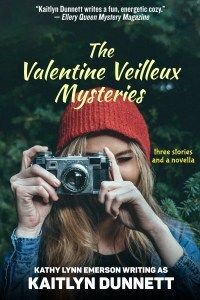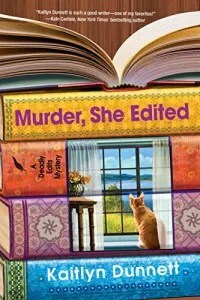The Name Game
Kaitlyn Dunnett/Kathy Lynn Emerson here, today musing about names.
Selecting the right name for each character, of course, is a crucial part of writing fiction. The name has to either fit, or deliberately not fit the character it is assigned to. Simple, right?
Not so much, especially if the writer has a backlist. Giving the same first name or surname to an important character in more than one book isn’t a great idea. If both books are part of the same series, it’s an even worse idea. Rule of thumb: do not confuse your readers.
When I was writing my Face Down series, set in sixteenth-century England, I kept a list of all the names I used in each book and short story and tried very hard not to repeat myself, even for minor characters. I also had a master list of names in use in that era, taken from history texts and genealogies. Some just sounded too modern, even though they were in use back then. Others struck me as too unusual. Still, better an odd name than the reality, which was that most of the population shared the same few first names: Anne, Mary, Jane, Elizabeth, and Catherine for women and Henry, John, Edward, Thomas, and Robert for men. Some of the odd ones? I found real women named Dowsabella, Philadelphia, Euphemia, Temperance, and Douglas, and real sixteenth-century men were named Amias, Ambrose, Manasses, Marmaduke, and Valentine. Religion entered into naming, too. Susanna was a name often chosen by Protestant parents while a girl named Ursula, Werburga, or Fridiswide was likely Catholic.

My amateur sleuth is Susanna, Lady Appleton, a Protestant
Contemporary naming can be just as tricky. Setting aside mutual agreements to use a real person’s name as the result of a charity auction, the careful writer needs to stop and think about how many people in his or her life have a particular name (first or last). If the character has traits in common with that acquaintance, it’s probably better to pick another name.
Sometimes, of course, characters name themselves and won’t accept any alternatives. Then, dear writer, you are stuck. Even if you try to change the name, you’ll end up typing it in by mistake. The Muse refuses to be messed with.

This Valentine (female) named herself.
In real life, people are often given names at birth that don’t fit them as they mature. This can be fun to play with in fiction, especially mystery fiction, where the fact that a character’s legal name is different from the one he or she is known by can be used to keep that character out of danger or plunge him or her into it.
My family tree is full of examples of people going by names other than the ones on their birth records. My grandfather, Fred Gorton, was never legally Frederick (or Alfred), although my uncle had them put Frederick on his death certificate. He did, however, add a middle initial to his signature as an adult, to distinguish himself from another Fred Gorton in the same town. He used an S with no period after it. If he had a middle name in mind, he never revealed it, but I have a sneaking suspicion that he chose the S for Scorcher, the nickname he was given as a teenager because he could ride his bike at such scorching speeds.
My other grandfather’s name was Leslie Hamilton Coburg. He went by Pat. I have no idea why. Similarly, my great-grandfather, Myron Gonzales Hornbeck was always called Miles. I have no explanation for that, either.
My father, William Russell Gorton, went by W. R. Gorton officially and was Russ to his friends. Mom was Theresa Marie but was always called Marie (although she was Mitzi to a few select pals). And me? My legal first and middle names, on the birth certificate and everything, are Kathy Lynn. That drove teachers crazy all through my schooldays. They kept insisting that Kathy had to be short for Katherine or Kathleen. I was just happy my folks didn’t go with the other name on their short list. I really cannot see myself as a Michelle.

The amateur sleuth in this series, however, is named Mikki, short for Michelle
Kathy Lynn Emerson/Kaitlyn Dunnett has had sixty-four books traditionally published and has self published others. She won the Agatha Award and was an Anthony and Macavity finalist for best mystery nonfiction of 2008 for How to Write Killer Historical Mysteries and was an Agatha Award finalist in 2015 in the best mystery short story category. In 2023 she won the Lea Wait Award for “excellence and achievement” from the Maine Writers and Publishers Alliance. She was the Malice Domestic Guest of Honor in 2014. She is currently working on creating new omnibus e-book editions of her backlist titles. Her website is www.KathyLynnEmerson.com.
Lea Wait's Blog
- Lea Wait's profile
- 509 followers



